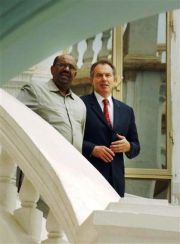UK Parties plead for sanctions to end Sudan slaughter
By Andrew Grice
LONDON, Nov 20, 2004 (The Independent) — Tony Blair is being urged to demand immediate and punitive sanctions against the Sudanese government in an attempt to halt the slaughter, ethnic cleansing and rape in the Darfur region.

|
|
Prime Minister Tony Blair meets with the Sudanese President President Omar el-Bashir at the palace in Khartoum Sudan Wednesday Oct. 6, 2004. (AP) |
Prominent figures from the three main political parties have written to the Prime Minister pleading with him to use Britain’s influence in the European Union and United Nations Security Council to secure international action over the “genocide” in Darfur. They warned that the crisis, which may already have claimed 100,000 lives, was worsening.
Michael Ancram, the shadow Foreign Secretary, Glenys Kinnock, the Labour MEP, and Sir Menzies Campbell, the Liberal Democrats’ foreign affairs spokesman, said the government in Khartoum was “largely to blame” for the crisis because it was working closely with the Janjaweed militia.
They told Mr Blair: “It is time to get tough with the Sudan government, the architect of this slaughter, ethnic cleansing, rape and racism. The British Government must not equate the actions of the Janjaweed and the government of Sudan, working in concert, with the comparatively small- scale attacks by the Darfur rebels; nor must we fail to hold the Sudan government to account for fear of upsetting the Khartoum regime (a regime that gave a home and protection to Osama Bin Laden for five years).”
The authors called for the enforcement of the no-fly zone agreed by the Sudan government and the Darfur rebels; sufficient resources and support for an African Union (AU) presence and targeted sanctions against the Sudan government, including a total arms embargo, freezing assets and a travel ban on the regime’s leaders.
They told the Prime Minister: “If you choose, Britain can lead the world in demanding the Khartoum regime stops the slaughter. If the government of Sudan can act with impunity and without serious challenge … others will be encouraged to do the same. The time for speeches and gestures is past.”
The three politicians were brought together by Lord Alton of Liverpool, an independent peer, who visited the region and reported on his findings in The Independent last month.
Sudan’s government and southern rebels vowed yesterday to end Africa’s longest civil war by 31 December, signing a pledge in Nairobi, Kenya, in front of 15 UN Security Council envoys who flew in from New York to demand an end to the fighting. The Security Council, in a rare meeting away from its Manhattan base, promised political and economic support once Sudan ended the two wars that have left millions dead.
The move was criticised by aid agencies. Oxfam said: “From New York to Nairobi, a trail of weak resolutions on Darfur has led nowhere.” Its spokesman, Caroline Nursey, said: “Yesterday Oxfam was unable to get vital aid to 200,000 people in Darfur who are cut off by renewed violence. Today they will still be in the camps, still waiting for aid and Oxfam will still be unable to reach them. We needed the council to take action now, not yet more diplomatic dithering.”
